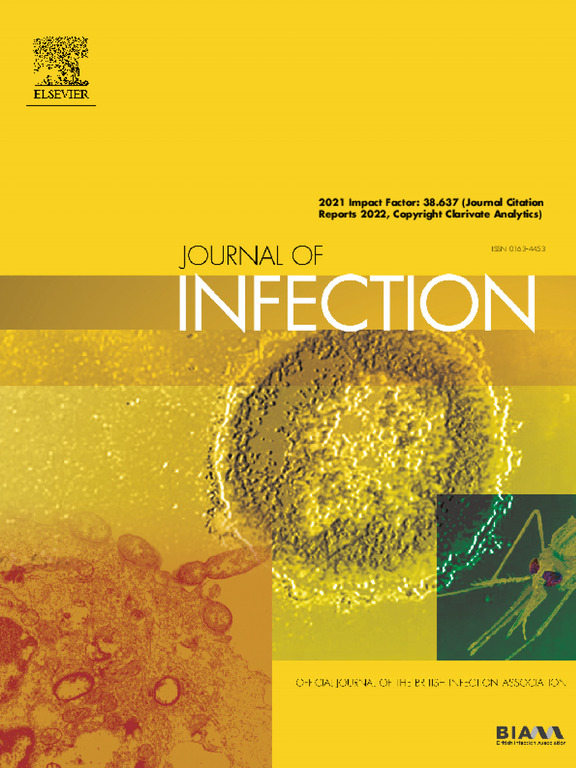抗菌药物管理查房对抗菌药物使用的影响以及建议、吸收和结果的预测因素。
IF 14.3
1区 医学
Q1 INFECTIOUS DISEASES
引用次数: 0
摘要
目的:确定引入抗菌药物管理(AMS)查房的影响。方法:我们采用中断时间序列的方法来调查在医院1实施AMS查房的影响,并与同一城市尚未实施AMS查房的医院2进行比较。回归模型用于确定给出建议的预测因素,是否遵循建议,以及建议接受与住院时间之间的关系。结果:引入AMS查房后,第1医院头孢曲松、环丙沙星、阿莫西林-克拉维酸酯、美罗培南和哌拉西林-他唑巴坦的使用出现新的或加速下降。除了头孢曲松,2号医院没有出现类似的下降。一半的评论(3471/6878;50%)建议进行干预;2003/2726(73%)随后评价的建议得到执行。相比药剂师或受过培训的专科医生,资深医生更有可能建议降低/停止使用抗生素,并听从他们的建议。先前的医疗辅助系统审查完成得越多,建议就越有可能被采纳。接受降级/停止使用抗菌素的建议与住院时间减少0.58天[95%CI 0.22-0.94]相关。结论:多学科AMS查房减少了抗生素的使用,并可能缩短了住院时间。资深临床医生的投入和更多医疗辅助队的经验增加了建议的吸收。数据共享:在当前研究中分析的数据集不公开,因为它们包含个人数据,但可以从牛津郡感染研究数据库(https://oxfordbrc.nihr.ac)获得。uk/ research-themes-overview/antimicrobial- resistance-and- modernis- microbiology/ infection -in-oxfordshire-research- Database -iord/),根据符合数据库伦理和管理要求的申请和研究建议。有关如何申请访问数据和研究计划模板的更多详细信息,请发送电子邮件至iord@ndm.ox.ac.uk。本文章由计算机程序翻译,如有差异,请以英文原文为准。
The impact of antimicrobial stewardship ward rounds on antimicrobial use and predictors of advice, uptake, and outcomes
Objective
To identify the impact of introducing antimicrobial stewardship (AMS) ward rounds.
Methods
We used an interrupted time-series approach to investigate the impact of implementing AMS ward rounds with in-person feedback from a multidisciplinary team in Hospital-1, also comparing to Hospital-2 in the same city where AMS ward rounds were not yet implemented. Regression models were used to identify predictors of advice given and of whether advice was followed, and associations between advice uptake and length of stay.
Results
Introducing AMS ward rounds was followed by new or accelerated declines in ceftriaxone, ciprofloxacin, amoxicillin-clavulanate, meropenem and piperacillin-tazobactam use at Hospital-1. Except for ceftriaxone, similar declines were not seen at Hospital-2. Half of reviews (3471/6878; 50%) recommended an intervention; 2003/2726 (73%) subsequently evaluated recommendations were implemented. Senior doctors were more likely than pharmacists or specialist doctors in training to recommend de-escalation/stopping antibiotics and to have their advice followed. The more prior AMS reviews completed, the more likely advice was to be followed. Following advice to de-escalate/stop antimicrobials was associated with a 0.58 day [95%CI 0.22–0.94] reduction in hospital stay.
Conclusions
Multidisciplinary AMS ward rounds reduced antibiotic use and likely reduced length of hospital stay. Senior clinician input and more AMS experience increased advice uptake.
求助全文
通过发布文献求助,成功后即可免费获取论文全文。
去求助
来源期刊

Journal of Infection
医学-传染病学
CiteScore
45.90
自引率
3.20%
发文量
475
审稿时长
16 days
期刊介绍:
The Journal of Infection publishes original papers on all aspects of infection - clinical, microbiological and epidemiological. The Journal seeks to bring together knowledge from all specialties involved in infection research and clinical practice, and present the best work in the ever-changing field of infection.
Each issue brings you Editorials that describe current or controversial topics of interest, high quality Reviews to keep you in touch with the latest developments in specific fields of interest, an Epidemiology section reporting studies in the hospital and the general community, and a lively correspondence section.
 求助内容:
求助内容: 应助结果提醒方式:
应助结果提醒方式:


